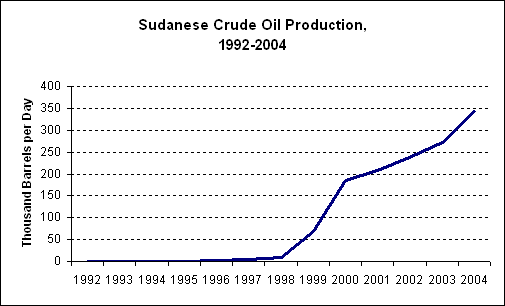Oil - Sudan
Natural resources such as oil not only have a complex geologic history but also a complicated political story. Read on to find out more about the Sudan's connection to oil.
Oil and politics in the Sudan
The country's oil and gas reserves are vast. Sudan's oil industry has 563 million barrels of proven oil reserves and an estimated three trillion cubic feet of gas reserves. The nation has been self-sufficient in supporting their own oil and gas use (except for jet fuel) since the year 2000. Oil comprises 70% of the total export earnings. Sudanese oil exploration has been limited to the central and south-central regions. The upstream oil industry could be key to the future of the economy of the Sudan. Although the country is considered to be vastly under-explored, it has been a producer of oil and gas for a number of years. The downstream oil industry in Sudan is an important sector in the country's economy as Sudan has three refineries and imports both refined product and crude oil.

Sudanese Crude Oil Production. Source: Energy Information Administration.
Upstream on the Nile River, exploration activity began at the end of the 1950s in the coastal waters of the Red Sea and Sudanese continental shelf. Internal political unrest caused many companies to withdraw from Sudan and the deterioration in security conditions on the oil fields caused the oil companies to suspend all operations in 1984. Since the early 1990's however, foreign oil companies began to return. In December 1996 the Greater Nile Petroleum Operating Company (GNPOC) was formed comprising the China National Petroleum Corporation, Petronas, Sudapet and Araxis which provided a much needed injection of capital, especially into developing the Unity and Heglig fields. In November 1997 the United States imposed sanctions against Sudan on the basis that profits from oil were being used to fuel the civil war. The pressure of sanctions has kept American firms out of Sudan, although Canadian company Talisman Energy is still operating in the Sudan. Talisman Energy has also purchased Araxis' share in GNPOC. Current players in Sudan include GNPOC, Lundin Oil (IPC Sudan Ltd), Petronas, Sudapet, Gulf Petroleum Corporation (GPC), China National Petroleum Corporation (CNPC), National Iranian Gas Company, OMV, Royal Dutch / Shell, and Talisman Energy. TotalFinaElf are reportedly looking to return to their concession in the Bor Basin and are listed as being the most likely partners to Petronas in their permit for Block 5B (see image3 in the following slideshow).
Downstream, distribution and marketing of fuels products is carried out by Agip, ExxonMobil, Nile Petroleum, and Shell. Earlier in 1996 it was announced that the government had begun negotiations with the distributors to end the government monopoly on the importation of petroleum products other than aviation fuel for foreign aircraft. The plan would be for distributors to import products in proportion to their current quotas (15%, 20%, 35% and 30% respectively) and resell to the government on (unfavorable) credit terms. The distribution infrastructure consists of river, road, pipeline and railway systems, all of which are in need of improvement. There is a product jetty at Port Sudan and 55 storage depots with a total capacity of 285 000 cu.m. A pipeline runs from the refinery at Port Sudan to the major consuming centre of Khartoum. (See image 3 in the slide show above.) The World Bank sees Sudan as a country with potential to reduce product costs and has made several recommendations for reducing costs and introducing a more efficient refining and marketing environment.
Sounds promising, right? Let's take a look at some of the problems and impacts of oil in the Sudan. Local populations are displaced—in fact, they are forced to evacuate without appropriate compensation. Local populations are losing their cultural identities as they are being moved and exposed to the outside world. Fertile agricultural land is lost to oil developments. The government of Sudan compensated those affected by the pipeline in the north but not in the south. There was no environmental assessment of how oil development could affect those living on oil fields in the southern Sudan. Granted, oil development led to oil field infrastructure, which led to making remote communities accessible to attacks by government forces. The spread of HIV/AIDS has increased, and new diseases have emerged unseen before in the southern Sudan. And I haven't even mentioned electricity shortages, civil war, and poor infrastructure... but I think you get the picture.